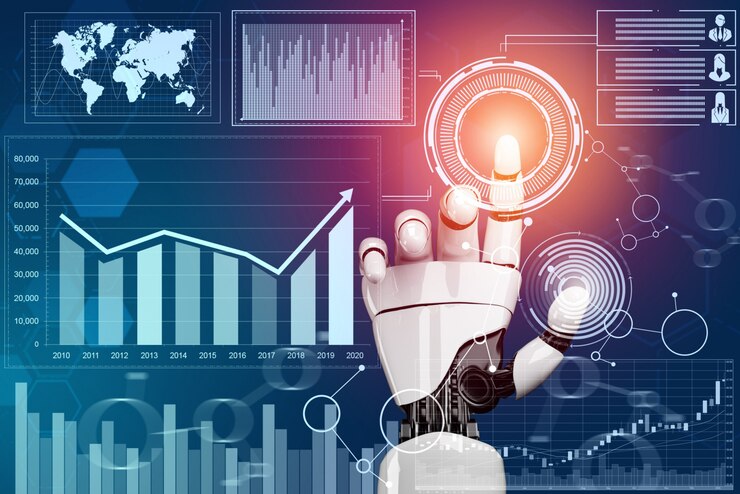In today’s fast-paced digital economy, making informed decisions is crucial for businesses to thrive. Companies need reliable, timely, and actionable insights into market trends, customer preferences, and competitor actions. Enter AI market research tools, the latest innovation in data analysis and business intelligence. Leveraging artificial intelligence (AI) to gather and interpret data, these tools are transforming how companies approach market research, ultimately leading to smarter, faster, and more effective decision-making. This blog explores how AI market research tools are reshaping business strategy and why they’re indispensable in today’s data-driven world.
Understanding AI in Market Research
AI-powered market research tools utilize machine learning algorithms and data processing techniques to analyze large volumes of information quickly. Traditional research methods relied on manual surveys, focus groups, and slow data gathering processes, which could be prone to errors and biases. In contrast, AI systems can access real-time data from multiple sources and analyze it with high precision, revealing patterns and trends that may be overlooked in manual research.
For example, AI can analyze customer feedback from social media, online reviews, and other digital platforms to uncover sentiment patterns, preferences, and emerging trends. The sheer speed and accuracy of AI provide businesses with a more comprehensive view of their target audience, helping them to make data-driven decisions confidently.
Key Benefits of Using AI in Market Research
- Faster Data Collection and Analysis
Traditional market research can take weeks or months to conduct, as it requires data collection, organization, and analysis. With AI, data collection and processing happen almost instantaneously. AI algorithms sift through vast amounts of data from multiple sources, extracting relevant insights in real time. This rapid data processing enables companies to stay ahead of market trends and respond proactively. - Improved Accuracy and Reduced Bias
AI-powered tools remove human bias, leading to more accurate research results. By relying on algorithms, companies can ensure that the data interpretation remains objective, focusing solely on the facts and patterns emerging from the dataset. Moreover, AI can identify anomalies or errors in the data, further enhancing accuracy. - Enhanced Customer Insights
AI systems can evaluate data from various customer touch points, such as purchase histories, feedback forms, and browsing patterns, to build a detailed profile of customer behavior and preferences. With these insights, businesses can craft more personalized marketing strategies, refine their product offerings, and improve customer satisfaction. - Cost-Effectiveness
Market research can be costly, especially when hiring research agencies or conducting extensive surveys. AI market research tools automate much of this process, cutting down labor costs and reducing the need for large research teams. This cost reduction allows companies of all sizes to access powerful research tools, leveling the playing field for smaller businesses to compete effectively. - Predictive Analytics
One of the most significant advantages of AI in market research is its ability to make predictive analyses. By studying historical data and recognizing patterns, AI can predict future market trends, customer preferences, and potential challenges. Predictive analytics help companies to anticipate market shifts and align their strategies accordingly, thereby reducing risk and increasing the likelihood of success.
Types of AI Market Research Tools
- Natural Language Processing (NLP)
NLP tools analyze text data from social media, customer reviews, and other written content to understand customer sentiment and identify emerging trends. By assessing the tone, keywords, and context of customer feedback, NLP tools provide valuable insights into how customers feel about a product, service, or brand. - Image Recognition Software
Image recognition technology is especially useful in industries like retail and consumer goods. These AI tools can analyze photos on social media to determine which products are most popular or identify visual elements that appeal to target audiences. - Chatbots and Virtual Assistants
AI-powered chatbots and virtual assistants engage directly with customers, gathering information about their preferences and feedback. This data is then processed to reveal insights about customer expectations and potential areas for improvement. - Predictive Analytics Models
Predictive analytics models use historical data to forecast future events. By analyzing past purchasing behavior, seasonal trends, and economic indicators, these models help companies anticipate demand, adjust pricing, and optimize inventory management. - Voice Recognition and Sentiment Analysis
Voice recognition tools, combined with sentiment analysis, allow companies to gather insights from customer service calls, feedback lines, and other spoken interactions. These insights provide a deeper understanding of customer satisfaction and can reveal areas where service can be improved.
How AI Market Research Tools Aid in Decision-Making
AI market research tools empower businesses to make decisions backed by data, reducing guesswork and enhancing strategic planning. Here’s how these tools drive better decision-making:
- Real-Time Adaptation to Market Changes: With real-time data insights, companies can quickly adjust their strategies to respond to changing market conditions or consumer demands.
- Identification of Untapped Markets: By analyzing demographic and behavioral data, AI can reveal emerging market segments, helping businesses to expand their reach and tap into new customer bases.
- Optimization of Marketing Campaigns: AI insights enable businesses to target the right audience with personalized messaging, improving the effectiveness of marketing campaigns and increasing return on investment.
- Product Development Insights: AI tools can highlight areas where product features can be improved based on customer feedback, enhancing product relevance and customer satisfaction.
Ethical Considerations in AI Market Research
While AI offers many advantages in market research, it also raises ethical considerations. Businesses must ensure transparency in how data is collected and used, safeguarding consumer privacy and adhering to data protection regulations. As AI becomes more advanced, companies should strive for ethical data usage, emphasizing accountability and fairness in their practices.
Future Trends in AI-Powered Market Research
The field of AI in market research continues to evolve, with several emerging trends that promise to make these tools even more powerful and user-friendly. Some of the notable trends include:
- Integration of AI with Other Technologies: AI is increasingly being combined with technologies like augmented reality (AR) and virtual reality (VR) to create immersive market research experiences.
- Greater Focus on Predictive and Prescriptive Analytics: As AI algorithms improve, the focus is shifting from merely descriptive insights to predictive and prescriptive analytics, helping companies take proactive measures based on future projections.
- Increased Use of Automation for Enhanced Productivity: Automation will play a more significant role in market research, allowing companies to gather data and generate reports with minimal manual input.
Conclusion
The impact of AI market research tools on modern business decisions cannot be overstated. These tools streamline data collection, enhance accuracy, and enable predictive insights that guide companies toward well-informed, strategic choices. As businesses increasingly adopt AI-driven market research, they gain a significant advantage in adapting to market dynamics, understanding their customers, and staying competitive in their industry. The future of AI in market research looks promising, with further advancements likely to enhance its efficiency, accessibility, and scope.
FAQs
- What are AI market research tools?
AI market research tools use artificial intelligence to gather, analyze, and interpret large volumes of data, providing insights into customer behavior, market trends, and competitive dynamics. - How do AI tools improve market research accuracy?
By eliminating human bias and analyzing data objectively, AI tools ensure greater accuracy in market research, making insights more reliable and actionable. - Can small businesses afford AI market research tools?
Yes, many AI market research tools are cost-effective, making them accessible to businesses of all sizes and allowing smaller companies to compete with larger competitors. - What is predictive analytics in AI market research?
Predictive analytics in AI market research involves using historical data to forecast future trends, helping companies make proactive and strategic decisions. - Are AI market research tools secure for handling customer data?
Reputable AI market research tools prioritize data security, adhering to strict privacy regulations and ensuring customer data is handled responsibly and securely.
By leveraging the power of AI market research, businesses are better equipped to understand their markets, predict customer needs, and make decisions that drive growth and innovation.




